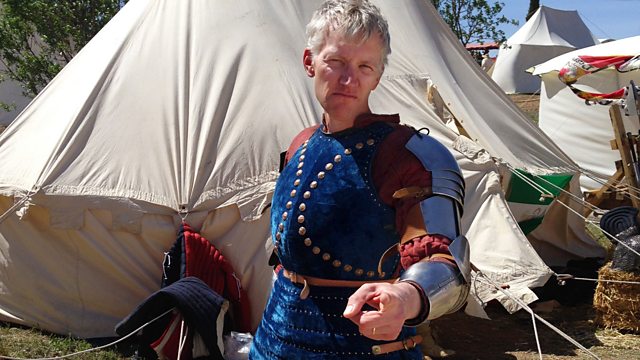The Radio Ballads, Dorothea Lange, Archaeology of the A14
Helen Castor on the photography of 1930s mid-west America by Dorothea Lange, the legacy of Charles Parker's radio ballads and archaeological insights along Britain's biggest dig.
Helen Castor is joined by Professor Lucy Robinson from the University of Sussex.
A new exhibition at the Barbican in London features the photography of Dorothea Lange who is best known for her coverage of the dust-bowl depression of mid-west America in the 1930s. Many of her now iconic images were actually staged - but does that alter their historical importance? Helen takes in the exhibition with the historian of race in modern America, Dr Melissa Milewski.
The 70th anniversary of the NHS at 70 is being marked across the 91热爆. In one of the more unusual ideas, Radio 3 are creating a symphony from the sounds that are commonplace in the health service. The inspiration for the piece comes from the "radio ballads" back in the late fifties and early sixties, produced by Charles Parker and featuring the music of Ewan McColl. Olivette Otele is a French-African historian who had never come across these radio programmes - so what can she glean about life in Britain sixty years ago by listening to them again?
And Tom Holland has a song of the road too. He's in Cambridgeshire, in the middle of Britain's biggest archaeological dig, where the A14 meets the A1 and a new historic landscape is being revealed.
Producer: Nick Patrick
A Pier production for 91热爆 Radio 4.
Last on
Guests
Helen Castor is joined in the studio by from the University of Sussex.
The Radio Ballads
On Saturday 30th June 91热爆 Radio 3 celebrated 70 years of the National Health service with a remarkable feature called The NHS Symphony. The programme took the everyday sounds of the NHS and mixed them with especially composed music to present an audio tribute to this much-loved British institution. The programme comes in a long line of 91热爆 radio programmes which have eschewed a presenter and used music, actuality recordings and spoken testimony to provide the narrative. The fore-runner of this technique was a series of programmes between 1958 and 1964 knows as The Radio Ballads. The first of these was a tribute to the train driver John Axon who lost his life trying to save his passenger鈥檚 lives in a train crash in 1957. It was broadcast 60 years ago.
听
To assess what these programmes tell us about life in Britain in the late fifties and early sixties , Making History asked the French historian听 听to have a listen. As well as clips from the original programmes,听 we hear from Sara Parker the daughter of producer Charles Parker who is involved with the .
Dorothea Lange
A exhibition, showcasing the work of one the great the American documentary photographers has recently opened at听 . Lange is probably best known for her work on the American mid-west migrants who fled the dustbowl depression and headed for the promise of work in California. Her photograph of Florence Thompson, which has become known as , taken in a Californian migrant camp has become the iconic image of those depression years in 1930鈥檚 America.
听
To find out more about Lange鈥檚 work and the way that she had to play with realities, Making History asked the historian of race in the USA 听to take a look at the new exhibition.
A14 Archaeology
As part of a 1.5 billion pound project to update a notorious bottle neck between the M11 near Cambridge and the A1 near Huntingdon, an covering an area the size of eight Vatican cities and employing over 250 archaeologists, has been busy for the best part of two years.
听
So, what better time to take stock. What鈥檚 been discovered? Well, in short, as Tom Holland discovered, some 6,000 years of archaeology which includes 25 new settlements, 7,000 small finds and a couple of rather sinister skeletons.
听
听
听
Making History is produced by Nick Patrick
听
Contact the programme: making.history@bbc.co.uk
听
听
Making History is a Pier Production for 91热爆 Radio 4
Broadcast
- Tue 3 Jul 2018 15:3091热爆 Radio 4
Podcast
-
![]()
Making History
Popular history series where the past connects with the present.


